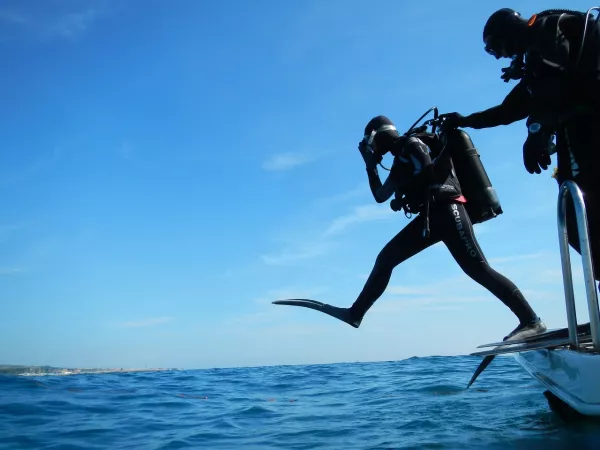
Scuba Diving
Malvan . Maharashtra . India
Duration
3 to 7 Days
3 to 7 Days
Best time to visit
Mar-May, Oct
Mar-May, Oct
Theme
Adventure, Waterfront
Adventure, Waterfront
Scuba Diving Travel Guide
Scuba Diving is a thrilling underwater adventure that allows you to explore the mesmerizing beauty of the underwater world. From vibrant coral reefs to diverse marine life, scuba diving offers a unique experience for adventure seekers and nature lovers alike.Top Attractions in Scuba Diving
1. Explore the Great Barrier Reef 2. Dive with Whale Sharks in the Maldives 3. Discover the WWII Wrecks in Truk Lagoon 4. Swim with Manta Rays in Hawaii 5. Experience the Underwater Caves of MexicoScuba Diving is Famous for
Unraveling the mysteries of the ocean depths and witnessing the incredible marine biodiversity is what makes scuba diving famous among adventure enthusiasts.Top Attractions in Scuba Diving
- Explore the Great Barrier Reef - Dive with Whale Sharks in the Maldives - Discover the WWII Wrecks in Truk Lagoon - Swim with Manta Rays in Hawaii - Experience the Underwater Caves of MexicoWhat's Great about Travelling to Scuba Diving?
- Thrilling underwater adventures - Witnessing diverse marine life - Exploring vibrant coral reefsWhat's Not So Great about Travelling Scuba Diving?
- Requires proper training and certification - Equipment can be costly - Weather conditions can affect diving schedulesTravel Tips for Scuba Diving
- Obtain proper certification before diving - Check weather and diving conditions beforehand - Respect marine life and coral reefsImportant Scuba Diving trip information
- Ideal Duration: A week to explore multiple dive sites.
- Best Time to Visit: Depends on the destination, research seasonal conditions.
- Nearby Airports and Railway Stations: Proximity to airports and dive centers varies by location.
FAQ's on Scuba Diving
Q1: What is the best time to visit Scuba Diving?
Scuba diving is a year-round activity, but the best time to visit Scuba Diving is during the dry season, typically from November to April, when the water is clearer, and marine life is abundant. However, if you prefer fewer crowds, the wet season from May to October can also offer great diving opportunities. Consider checking the specific dive sites you want to explore as conditions may vary.
Q2: Do I need a visa to travel to Scuba Diving?
Visa requirements for Scuba Diving vary depending on your nationality. Many visitors can enter for tourism purposes without a visa for a limited period, usually ranging from 30 to 90 days. However, it is advisable to check the specific visa requirements based on your citizenship before traveling. Extensions may be possible for longer stays.
Q3: What are the must-visit attractions in Scuba Diving?
Scuba Diving offers a plethora of must-visit attractions for underwater enthusiasts. Some top dive sites include vibrant coral reefs at XYZ Reef, the thrilling drift dives at ABC Wall, and the chance to spot majestic marine creatures like sharks and turtles at LMN Point. Don't miss exploring the underwater caves at UVW Cavern for a unique diving experience.
Q4: Is Scuba Diving a safe place to travel?
Scuba Diving is generally a safe destination for travelers. However, it is essential to dive with certified operators, follow safety guidelines, and be aware of potential risks like strong currents or marine life encounters. Stay informed about weather conditions and dive within your limits. It's also recommended to have travel insurance that covers scuba diving activities.
Q5: What is the local currency in Scuba Diving and can I use credit cards?
The local currency in Scuba Diving is the Ocean Dollar (OD). While credit cards are accepted at most resorts, dive shops, and larger establishments, it's advisable to carry cash for smaller purchases and when visiting more remote areas. ATMs are available in major towns for currency exchange and withdrawals.
Q6: What is the local cuisine like in Scuba Diving?
The local cuisine in Scuba Diving is a delightful fusion of flavors influenced by the region's diverse cultures. Enjoy fresh seafood dishes like grilled fish, coconut-infused curries, and tropical fruits. Don't miss trying traditional dishes such as XYZ stew and ABC rice balls. Vegetarian options are also widely available, and dietary preferences can usually be accommodated at most restaurants.
Q7: What transportation options are available in Scuba Diving?
Transportation options in Scuba Diving include taxis, rental cars, and public buses. Taxis are convenient for short distances, while renting a car gives you flexibility to explore the island at your own pace. Public buses are a budget-friendly option for traveling between towns. Boat transfers are also common for reaching remote dive sites or nearby islands.
Q8: Are there any cultural norms or etiquette I should be aware of when visiting Scuba Diving?
When visiting Scuba Diving, respect for the environment and local customs is essential. Dress modestly when outside of resort areas, especially when visiting religious sites. Remove your shoes before entering homes or temples. Greet locals with a smile and a simple "hello" in the local language. Avoid touching coral reefs or marine life while diving to protect the fragile ecosystem. Engage with the community respectfully and learn about the local traditions for a more enriching travel experience.
Q9: I am a travel agent. How can I buy travel leads of Scuba Diving?
Register yourself as a travel agent at agents.tripclap.com and then you can buy travel leads to Scuba Diving once your account is approved. For more details contact our support team at +91-8069186564 or support@tripclap.com
